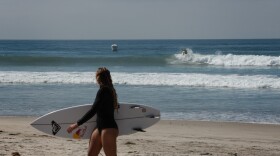For the past two months, residents have been protesting a proposed 22-story apartment building on Turquoise Street in Pacific Beach, near the border with La Jolla.
The project from development firm Kalonymus would be the neighborhood's first high-rise in more than 50 years, far surpassing the 30-foot coastal height limit imposed by city voters in 1972. It would feature 213 apartments — 10 of them with affordable rent restrictions — over 311 parking spaces and ground floor retail.
But nearly two-thirds of the apartments would legally be considered "visitor accommodations" — urban planning talk for hotel rooms. They'd come with complete kitchens and would be indistinguishable from the remaining apartments. Kalonymus plans to rent them out as long-term housing.
To supporters of the project, it's a creative way to maximize the site's development potential and provide significantly more housing than would otherwise be allowed. The project is within walking distance to multiple bus routes, and Pacific Beach is considered a "highest resource" community with the state's cleanest air, best schools, best jobs and nicest amenities like parks and beaches.
"Projects like these are great for students because if I graduate next year and I start working in San Diego, where am I supposed to live?" said Mike Borisov, a fourth-year student at UC San Diego who advocates for housing policy reforms. "It's unfair to really think that you deserve to live in PB and other people don't."
To the project's opponents, the towering height of 239 feet would be an affront to their neighborhood's character. And they see the "hotel rooms" as a loophole in the state's affordable housing density bonus law, which offers relief from building regulations like height and density limits in exchange for setting aside a portion of the project as affordable housing.
"We need affordable housing in Pacific Beach and all along the coast — that's not disputed," said Marcella Bothwell, chair of both the Pacific Beach Planning Group and the newly founded Neighbors for a Better California. "But the trade-off here is a mockery to a well-intentioned law."
Neighbors for a Better California hopes to fight the project in court — though the project is not subject to the state's strict environmental laws, nor does it fall under the jurisdiction of the California Coastal Commission. The state's density bonus law has been repeatedly upheld by the courts.
State Senator Catherine Blakespear, whose district includes Pacific Beach, voted last year to expand the density bonus law. But she said laws have "all sorts of unintended consequences," and she wrote a letter last month voicing opposition to the proposed high-rise.
"I think there are ways for us to provide housing for our community that we need, while also largely maintaining the neighborhoods that we have and protecting our sensitive coastal resources and providing for a better quality of life for everybody," Blakespear said.
The density bonus law as it stands today has its origins in San Diego. The city adopted an enhanced version of the program in 2016 that was codified into state law in 2020.
Also in 2020, the city expanded its density bonus program to offer even more incentives if a project includes both low-income and moderate-income affordable housing. That local program was also written into state law by San Diego Assemblymember David Alvarez.
The expansions of the density bonus law are credited with boosting production of both market-rate and affordable housing, which experts say is crucial to lowering housing costs.
Alvarez said he's wary of high-rise buildings popping up all over San Diego's coastal neighborhoods, and he's open to amending state law to clarify the difference between housing and visitor accommodations. But he said he generally supports building more housing in high-opportunity neighborhoods like Pacific Beach.
"Through the use of local laws called zoning, we have excluded particular segments of our population from living in certain parts of San Diego, (which has) led to things like a segregated city," Alvarez said. "I firmly believe that people from all walks of life should be able to live in any part of our great state and certainly of our amazing city."
City staffers are still reviewing the application for the high-rise on Turquoise Street. They recently asked state housing officials for assistance in determining whether the project complies with the law.
The local "loophole" that could allow the project's quasi-hotel rooms to be rented as housing has already been closed. The city amended its municipal code in October to limit stays in visitor accommodations to no more than 30 days.
But that change came too late to impact the Pacific Beach high-rise. Kalonymus submitted its application before the change took effect, meaning its project is subject to the rules in place at that point in time.








